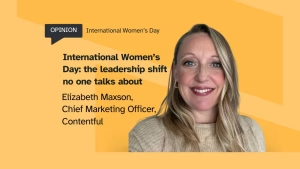by Cate Murden, Founder and CEO at Push Mind & Body
The past few years have seen a seismic shift in where, when and how businesses operate.
As a consequence of the pandemic, the decades-old business model of rigid office-based working has been destroyed. The world we once knew is no longer, as the vast majority of professional organisations have pivoted to a hybrid or remote working model.
However, this has spurred a series of cascading problems: rising mental health issues, organisational struggles and a marked decline in the importance, and effectiveness, of work.
Before the pandemic research we conducted in partnership with mental health charity Mind, showed nearly half of all employees (48%) said “work” was most important to them. Post pandemic research has shown time and time again that figure has plummeted.
This raises an interesting question. If the post-pandemic working model is supposed to offer employees a better quality of life, then why are people suffering more? Could it be from a lack of connection, support and meaning?
The destruction of the decades-old business model
The rigid structures of the pre-pandemic business model afforded little flexibility to staff and didn’t place any emphasis on key issues such as mental health and the importance of developing healthy, productive relationships among staff.
When the pandemic emerged, companies had no choice but to respond with the introduction of remote and hybrid working. Pretty quickly, most employees realised that this new model could enable greater flexibility to fit work around their life. There is no doubt this model offers employees greater flexibility and freedom, but most organisations have failed to address the behaviours and skill sets needed to thrive in such an environment.
For starters, companies have failed to acknowledge the trauma that the pandemic caused among employees. Working in isolation has only exacerbated these issues. This mental and emotional baggage must now be carried within the context of an entirely new working model – one that provides less opportunity for physical interaction.
Put simply, at a time when people need more support than ever, in most instances it feels like we are getting less of it than ever before. This is a recipe for disaster. It’s not surprising, then, to see issues such as “quiet quitting” gain notoriety.
On a practical level, it’s not hard to see how this lack of connection is impacting organisations effectiveness. But the hybrid/remote working model isn’t solely to blame for these issues.
Rather, these problems stem from a lack of organisational willingness to support employees and prioritise wellbeing, particularly at a time when already damaged people are being asked to operate in an entirely new framework.
What has caused the post-pandemic business model to break?
Since the pandemic, most professional businesses have pivoted to a hybrid or remote working structure.
While this added flexibility has good intentions, it has exacerbated ongoing mental health issues and separation that arose during the pandemic (none of which have been effectively supported or dealt with). Today, employees report a notable rise in mental health struggles.
Whilst hybrid and remote working models are hugely exciting, organisations have let employees down by not contemplating that this new model needs a new set of behaviours and mindsets not just frameworks, tech and policies – after all, we have been through the world’s greatest transformation programme!
On top of rising mental health struggles, there are issues surrounding communication breakdown, worsening relationships, and a lack of trust between employer and employee.
Clearly, there has never been a more critical moment for C-Suite to lead from the top and upskill managers with the new opportunities to come together safely needed to ensure that employees remain well, engaged, connected and productive.
An opportunity for rebirth
While the status quo has gone awry, there’s now an opportunity for rebirth.
When it comes to self-care, we have seen a complete shift in the prioritisation of what truly matters to employees. While “work” has declined in its importance significantly, it’s clear that employees are starting to realise the importance of being treated as a human and are now seeking to prioritise their own mental wellbeing as a result.
This is a significant shift that demonstrates the need for companies to follow suit if they want their employees to remain engaged with them.
We are on challenging terrain, working in new, dynamic and untested ways.
The decades-old business model has been replaced with a new alternative that offers hope for a more flexible and dynamic future. And yet, while remote and hybrid working models are hugely exciting, this places a significant burden on a lot of mentally bruised people to adapt, evolve and thrive on their own accord.
As a result, stress, burnout and anxiety are on the rise and organisational effectiveness is diminishing. This is not the vision of a better tomorrow that we’ve been promised.
To solve this, organisations need to equip all levels of the business with the behaviours and skill sets needed to thrive in this new environment. From executive leadership to middle managers to employees, a resounding commitment to change is required.
While the best companies in the world are supporting their people this way, we believe this needs to become the norm. Only then can we build a future working model that aligns the best interests of the organisation and its people.










